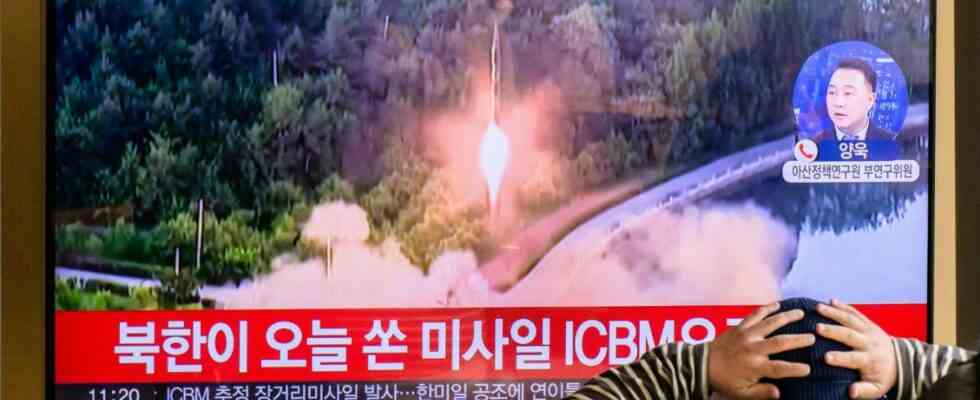It’s one of those rocket days in Seoul again. South Korea’s military chief of staff has reported that North Korea appears to have fired an ICBM east into the Pacific, a weapon that North Korea could also use to hit its nemesis, the United States. But for the innkeeper Eugene Nah, this is not a particularly noteworthy event. He is standing in his restaurant in Yongsan District. It’s almost noon. The guests will come soon. That interests him more than the rocket.
“Ten years ago, people were still afraid of rockets,” he says. Not any longer longer. The fire from Pyongyang is now well known. “People know that North Korea is talking to the United States through the missiles,” says Nah. “They know that North Korea will not shoot at South Korea. Otherwise, the Kim Jong Un regime would be finished.” In addition, everyday life is exhausting enough for most – you can’t be driven crazy by rockets, which you only see in the media anyway.
Kim Jong-un has never afforded such a loss of arms
North Korea has sent more than 50 test missiles into the seas around the Korean peninsula in the past two months. Kim Jong-un has never afforded such a loss of arms. And even if ordinary people in South Korea don’t make a big deal out of it – the military, politicians and experts cannot simply let the situation rest. Especially since the Ministry of Defense in Tokyo reported that Friday’s rocket fell into the Pacific Ocean just around 200 kilometers west of Japan’s northern island of Hokkaido, i.e. in Japan’s Exclusive Economic Zone.
On the sidelines of the Asia-Pacific economic summit in Bangkok, there was therefore an emergency meeting with US Vice President Kamala Harris, South Korea’s Deputy Prime Minister Han Duck-soo, Japan’s Prime Minister Fumio Kishida, his counterparts Anthony Albanese (Australia) and Justin Trudeau (Canada) and New Zealand’s Prime Minister Jacinda Ardern. Together they called on North Korea to refrain from provocations. Later, South Korean and American Air Force fighter jets took off. According to the South Korean general staff, the exercise was about launching North Korean missile systems. US National Security Council Communications Director John Kirby later said it did not see the recent missile test as a “threat” to its own country, but was “deeply concerned” about North Korea’s ballistic missile program.
“South Korea must start developing its own nuclear weapons”
The question is what will help against North Korea’s missile tests in the long run. The demand for nuclear weapons for South Korea seems to be getting louder at home and abroad. Polls this year by the Chicago Council on Global Affairs and the Asan Institute for Political Studies in Seoul found that 71 and 70 percent of South Koreans support nuclear weapons in their country, respectively. The ROK Forum for Nuclear Strategy, an interest group for South Korea’s nuclear armament, has been in place in Seoul since the beginning of the month. More than a dozen experts have already joined. Initiator Cheong Seong-chang, a senior analyst at the Sejong Institute, says in the Korea Times: “South Korea must start developing its own nuclear weapons. This is the only way that can lead to the denuclearization of the Korean peninsula.”
Cheong’s strategy has four stages. Stage One: Threaten to withdraw from the NPT if North Korea tests nuclear weapons or something similar. Second stage: actually withdraw from the nuclear non-proliferation treaty if North Korea remains stubborn. Third stage: build nuclear weapons. Fourth stage: negotiate with North Korea on mutual disarmament of the nuclear arsenal.
The idea seems risky. The nuclear power Russia is at war in Ukraine, which is why the global security situation is more tense than it has been since the Cold War. Nuclear weapons for the small US partner South Korea would not be a good sign. And whether they would impress Kim Jong-un is debatable. So far he hasn’t let himself be deterred by the strength of his opponents. “The US and South Korea are conventionally superior to the North Korean military,” writes Zachary Keck, a defense expert and former member of the US House Foreign Affairs Committee, in the magazine foreign policy“Seoul alone spends about ten times as much on its military as Pyongyang, and the technological gap is even greater.”
For Keck there is also no doubt that the US would respond to a nuclear attack by North Korea on the South with its own nuclear weapons. “Many are concerned that if Donald Trump or anyone with similar views becomes president again, the US could withdraw from the Korean peninsula,” Keck writes. “Understandable. But that ignores the almost unanimous, bipartisan support for US troop presence in South Korea.”
The discussion shows how threatening the situation on the Korean peninsula is. Desperate calls for rearmament are getting louder. People like the innkeeper Eugene Nah don’t feel as if they should distrust the American-South Korean alliance.

